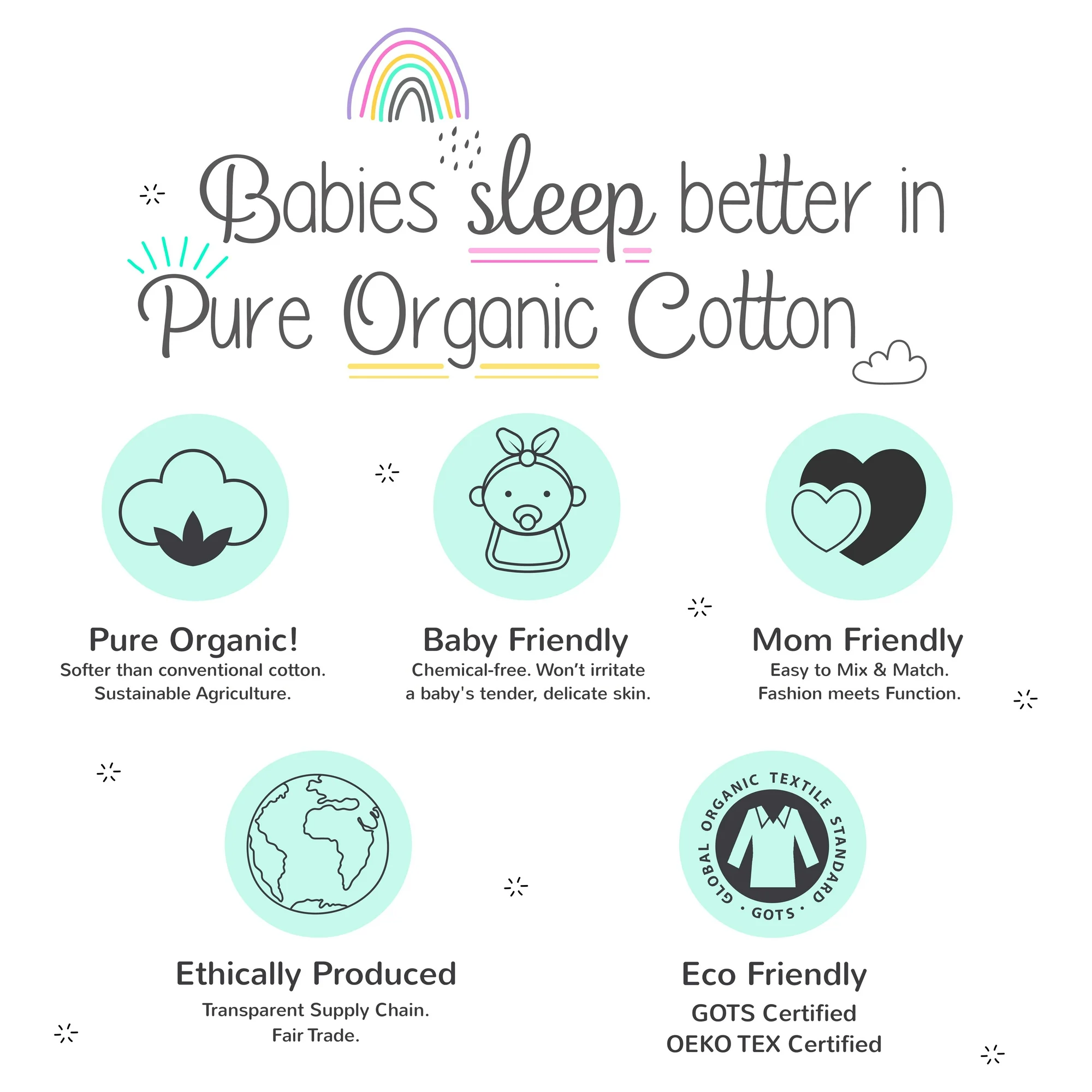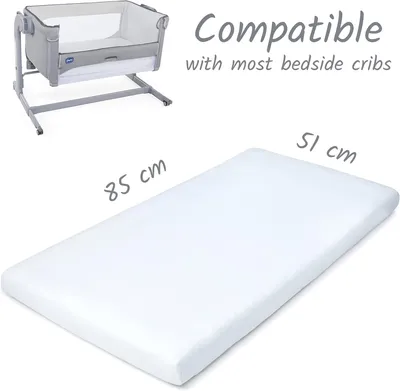Table of Contents
When it comes to creating a safe and comfortable sleep environment for your little one, choosing the right bedding is crucial. Organic cotton crib sheets have become increasingly popular among parents who want to ensure their baby’s comfort while also being mindful of environmental and health concerns. In this comprehensive guide, we’ll explore everything you need to know about organic cotton crib sheets, from their benefits to how to choose and care for them.
Disclosure: As an Amazon Associate, I earn from qualifying purchases. This means that if you click on a link and make a purchase, I may receive a small commission at no extra cost to you. Thank you for supporting greenlifehub.com.
What are organic cotton crib sheets and why are they important?
Organic cotton crib sheets are baby bedding items made from cotton that has been grown and processed without the use of harmful chemicals, pesticides, or synthetic materials. These sheets are designed to fit snugly on a crib mattress, providing a soft and comfortable surface for your baby to sleep on. The importance of organic crib sheets lies in their ability to create a non-toxic sleep environment for your little one, free from potentially harmful substances that can be found in conventional bedding options.
Understanding the benefits of organic cotton for baby bedding
Organic cotton offers numerous advantages when it comes to baby bedding. Firstly, it’s hypoallergenic, making it an excellent choice for babies with sensitive skin or allergies. The absence of harsh chemicals in the production process means that organic cotton crib sheets are less likely to cause skin irritation or allergic reactions.
Additionally, organic cotton is highly breathable, which helps regulate your baby’s body temperature during sleep, reducing the risk of overheating. The soft texture of organic cotton also provides a cozy and comfortable surface for your little one to rest on, promoting better sleep quality.
How organic crib sheets differ from conventional options
Unlike conventional crib sheets, which may be treated with chemicals or made from synthetic materials, organic cotton crib sheets are made from natural, eco-friendly fibers. This means they are free from toxic substances such as formaldehyde, flame retardants, and other potentially harmful chemicals often found in non-organic bedding.
Organic cotton is also grown without the use of pesticides or genetically modified organisms (GMOs), making it a more sustainable and environmentally friendly choice. When you choose organic crib sheets, you’re not only providing a safer sleep environment for your baby but also supporting more sustainable farming practices.
The impact of organic cotton on your baby’s sleep environment
Creating a healthy sleep environment for your baby is essential for their growth and development. Organic cotton crib sheets contribute to this by ensuring that your little one is surrounded by natural, non-toxic materials during sleep. The breathable nature of organic cotton helps maintain a comfortable temperature, reducing the risk of night sweats and promoting better sleep.
Additionally, the soft texture of organic cotton can provide a soothing sensory experience for your baby, potentially leading to longer and more restful sleep periods. By choosing organic cotton crib sheets, you’re taking an important step in creating a safe and nurturing sleep space for your baby.
How do I choose the right organic cotton crib sheets for my baby?
Selecting the best organic crib sheets for your little one involves considering several factors to ensure you’re making the right choice. From understanding certifications to evaluating the fit and feel of the sheets, there are various aspects to keep in mind when shopping for organic cotton crib bedding.
Factors to consider when buying crib sheets
When choosing organic cotton crib sheets, there are several key factors to consider. First and foremost, ensure that the sheets are made from 100% organic cotton to guarantee the purity of the material. Look for sheets that are soft to the touch, as this will provide the most comfort for your baby’s delicate skin.
The fit is also crucial, opt for fitted crib sheets that have elastic all around the edges to ensure a snug fit on the crib mattress. This helps prevent bunching or loose fabric that could pose a safety risk. Consider the thread count as well; while higher thread counts can indicate softer sheets, a moderate thread count (around 200-300) is often sufficient for baby bedding and can offer a good balance of softness and durability.
Understanding organic certifications like GOTS
When shopping for organic cotton crib sheets, you’ll likely come across various certifications. The most recognized and stringent certification for organic textiles is the Global Organic Textile Standard (GOTS). GOTS-certified organic crib sheets ensure that the entire production process, from harvesting of the raw materials through manufacturing, meets strict environmental and social criteria.
This certification guarantees that the cotton is grown organically and that the finished product is free from harmful chemicals. Other certifications to look out for include OEKO-TEX Standard 100, which tests for harmful substances in textiles, and USDA Organic, which certifies that the cotton is grown according to federal guidelines. By choosing crib sheets with these certifications, you can be confident that you’re providing a truly organic and safe sleep environment for your baby.
Selecting the best organic crib sheets for sensitive skin
If your baby has particularly sensitive skin or is prone to allergies, selecting the right organic cotton crib sheets becomes even more crucial. Look for sheets that are not only made from organic cotton but are also labeled as hypoallergenic. These sheets are less likely to cause skin irritation or allergic reactions. Some organic crib sheets are also processed without the use of dyes or with natural, plant-based dyes, which can be gentler on sensitive skin.
Consider the texture of the sheets as well – a smooth, soft surface is less likely to irritate your baby’s skin than a rougher texture. Reading customer reviews can be helpful in determining which organic crib sheets are best suited for babies with sensitive skin, as other parents often share their experiences with various products.
Are organic cotton crib sheets worth the investment?
When it comes to choosing bedding for your baby’s crib, the decision to invest in organic cotton crib sheets is one that many parents grapple with. While organic options often come with a higher price tag, it’s important to consider the long-term benefits and value they provide for your little one’s health and comfort.
Comparing costs of organic vs conventional crib sheets

It’s true that organic cotton crib sheets typically cost more than their conventional counterparts. This price difference is due to several factors, including the higher cost of organic farming practices, stricter manufacturing processes, and certifications required for organic products. While you might find conventional crib sheets at lower prices, it’s essential to consider what you’re getting for your money.
Organic crib sheets offer the assurance of chemical-free materials, which can be particularly important for your baby’s sensitive skin and developing immune system. When comparing costs, it’s also worth noting that organic cotton crib sheets are often more durable than conventional options, potentially lasting longer and providing better value over time. This durability means you might need to buy fewer sheets in the long run, offsetting the initial higher cost.
Long-term benefits of choosing organic cotton for your baby
Investing in organic cotton crib sheets offers several long-term benefits for your baby and the environment. By choosing organic, you’re reducing your baby’s exposure to potentially harmful chemicals and pesticides that can be present in conventional cotton products. This can contribute to better overall health and reduce the risk of skin irritations or allergic reactions. Organic cotton is also known for its softness and breathability, which can improve your baby’s sleep quality and comfort.
From an environmental perspective, organic cotton farming practices are more sustainable, using less water and energy while promoting biodiversity. By supporting organic cotton production, you’re contributing to a healthier planet for your little one’s future. Additionally, many parents find that starting with organic crib sheets leads them to make more conscious choices in other areas of baby care, fostering a healthier lifestyle overall.
Finding affordable organic crib sheet options
While organic cotton crib sheets can be more expensive, there are ways to find more affordable options without compromising on quality. Look for sales and discounts from reputable baby product retailers, especially during seasonal changes or holiday periods. Some brands offer bundle deals where you can purchase multiple sheets at a discounted rate. Consider joining parenting groups or forums where members often share information about sales or good deals on organic baby products.
Another option is to look for organic cotton blend sheets, which combine organic cotton with other natural fibers like bamboo or hemp. These blends can offer similar benefits at a lower price point. Additionally, some budget-friendly brands are now offering certified organic crib sheets at more accessible prices as the demand for organic baby products continues to grow. Remember, while it’s important to find affordable options, always ensure that the sheets you choose are certified organic to guarantee their quality and safety for your baby.
How do I ensure a proper fit for organic cotton crib sheets?
Ensuring that your organic cotton crib sheets fit properly is crucial for both your baby’s comfort and safety. Ill-fitting sheets can bunch up, creating potential hazards in the crib, while also diminishing the overall comfort of your little one’s sleep environment.
Understanding crib mattress sizes and sheet dimensions

Crib mattresses come in standard sizes, but it’s important to note that there can be slight variations between manufacturers. The typical size for a full-size crib mattress is approximately 52 inches long by 28 inches wide. However, the thickness can vary, usually ranging from 4 to 6 inches. When shopping for organic cotton crib sheets, pay close attention to the dimensions listed on the packaging or product description. Most fitted crib sheets are designed to fit mattresses up to 6 inches thick, but it’s always best to double-check.
Some organic crib sheets come with extra deep pockets to accommodate thicker mattresses or mattress toppers. If you’re using a mini crib or a non-standard size crib, be sure to measure your mattress carefully and look for sheets specifically designed for these dimensions. Understanding these measurements will help you choose crib sheets that fit snugly and securely on your baby’s mattress.
Tips for choosing fitted crib sheets that stay in place
To ensure your organic cotton crib sheets stay securely in place, look for features that enhance their fit. Fitted crib sheets with elastic all around the edges, rather than just on the corners, tend to provide a more secure fit. Some sheets also come with additional elastic straps or reinforced corners for extra security. When putting the sheet on the mattress, make sure it’s pulled taut and tucked firmly under each corner of the mattress.
A good way to test the fit is to press down on the centre of the mattress – if the sheet pops up at the corners, it’s too loose. Additionally, consider the material’s stretchiness; organic cotton with a bit of stretch can help the sheet conform better to the mattress shape. Remember, a properly fitted sheet not only stays in place better but also reduces the risk of the sheet coming loose during the night, which is important for your baby’s safety.
Addressing fit issues with mini cribs and non-standard mattresses
If you’re using a mini crib or have a non-standard mattress size, finding the right fit for your organic cotton crib sheets can be more challenging. Mini cribs typically measure about 38 inches long by 24 inches wide, significantly smaller than standard cribs. For these, look for sheets specifically labeled for mini cribs or portable cribs. Some brands offer “universal fit” sheets that can accommodate both standard and mini crib sizes, which can be a versatile option.
If you’re dealing with a truly unique mattress size, consider custom-made organic crib sheets. While this option may be more expensive, it ensures a perfect fit for your specific needs. Another alternative is to use flat sheets and tuck them securely under the mattress, though this requires extra vigilance to ensure they stay in place. Always prioritize a snug fit to maintain a safe sleep environment for your little one, regardless of your crib or mattress type.
What are the best practices for caring for organic cotton crib sheets?
Proper care and maintenance of your organic cotton crib sheets are essential to preserve their quality, extend their lifespan, and ensure they remain safe and comfortable for your baby. By following best practices for washing, storing, and rotating your sheets, you can maximize their durability and effectiveness.
Washing and maintaining organic cotton sheets
When it comes to washing your baby’s organic cotton crib sheets, gentle care is key. Always check the care label for specific instructions, but generally, organic cotton sheets should be washed in cold or warm water on a gentle cycle. Use a mild, eco-friendly detergent that’s free from harsh chemicals and fragrances to maintain the integrity of the organic fabric and protect your baby’s sensitive skin. Avoid using fabric softeners or dryer sheets, as these can leave residues that may irritate your baby’s skin and reduce the sheet’s absorbency.
Instead, consider adding a cup of white vinegar to the rinse cycle to naturally soften the fabric and remove any lingering soap residue. When drying, opt for air-drying when possible, as this is gentler on the fabric and more environmentally friendly. If using a dryer, choose a low heat setting to prevent shrinkage and maintain the softness of the organic cotton. Regular washing not only keeps the sheets clean but also helps maintain their softness and breathability.
Extending the life of your organic crib bedding
To get the most out of your investment in organic cotton crib sheets, it’s important to take steps to extend their lifespan. One effective strategy is to rotate your sheets regularly. This not only ensures that wear is distributed evenly but also allows each set to ‘rest’ between uses, which can help maintain their shape and elasticity. When not in use, store your organic crib sheets in a cool, dry place away from direct sunlight to prevent fading and fabric degradation.
Consider using breathable cotton storage bags rather than plastic containers to protect the sheets while allowing air circulation. If you notice any loose threads or small tears, address them promptly to prevent further damage. For minor repairs, use a needle and thread made from organic cotton to maintain the sheet’s organic integrity. By taking these proactive steps, you can significantly extend the life of your organic crib bedding, ensuring that it remains a safe and comfortable option for your baby throughout their early years.
Storing and rotating crib sheets for optimal use
Implementing a system for storing and rotating your organic cotton crib sheets can help maintain their quality and ensure you always have a clean set ready. Keep a minimum of three to four sets of sheets on hand, allowing you to have one on the crib, one in the wash, and one or two in storage. When storing, fold the sheets neatly to minimise wrinkles and creases.
If space allows, hang the sheets on padded hangers to prevent fold lines and maintain their shape. Create a rotation schedule, using each set of sheets for a few days before switching to a fresh set. This rotation not only distributes wear evenly but also ensures that your baby always has a clean, fresh sheet to sleep on.
When changing sheets, take a moment to inspect them for any signs of wear or damage. By catching and addressing issues early, you can prevent small problems from becoming bigger ones that might compromise the sheet’s safety or comfort. Remember, proper storage and regular rotation not only extend the life of your organic crib sheets but also contribute to maintaining a hygienic and comfortable sleep environment for your little one.
How do organic cotton crib sheets compare to other materials like bamboo or linen?
When choosing crib sheets for your baby, it’s important to consider various materials beyond just organic cotton. Bamboo and linen are two popular alternatives that offer their own unique benefits. Understanding how these materials compare can help you make the best choice for your little one’s needs.
Pros and cons of different crib sheet materials
Organic Cotton
Organic cotton crib sheets are known for their softness, durability, and hypoallergenic properties. They’re breathable, which helps regulate your baby’s body temperature, and they become softer with each wash. However, they can be more expensive than conventional cotton and may wrinkle easily.
Bamboo
Bamboo crib sheets, on the other hand, are praised for their silky smooth texture and excellent moisture-wicking properties. They’re also naturally antimicrobial and highly sustainable. The downside is that pure bamboo sheets can be quite expensive, and some bamboo products may use chemical processes in their production.
Linen
Linen crib sheets are extremely durable and have excellent temperature-regulating properties. They’re also hypoallergenic and become softer over time. However, linen can feel rough initially and often requires multiple washes to achieve optimal softness. It’s also prone to wrinkling and can be more expensive than other options. Each material has its strengths, and the best choice often depends on your specific priorities, whether it’s eco-friendliness, texture, or temperature regulation.
Breathability and comfort comparisons
When it comes to breathability and comfort, all three materials – organic cotton, bamboo, and linen – have their merits. Organic cotton is naturally breathable and soft, making it an excellent choice for babies with sensitive skin. It allows air to circulate freely, helping to keep your little one cool in summer and warm in winter. Bamboo crib sheets are often touted as even more breathable than cotton. They have excellent moisture-wicking properties, which can be particularly beneficial for babies who tend to sweat during sleep.
Bamboo sheets are also incredibly soft, often compared to high-quality silk in terms of texture. Linen, while initially crisp, becomes increasingly soft and comfortable with use. It’s highly absorbent and dries quickly, which contributes to its excellent breathability. Linen is also known for its ability to regulate temperature, keeping babies cool in summer and warm in winter. When comparing these materials, consider your local climate and your baby’s specific needs. For instance, if you live in a humid area or have a baby who tends to overheat, the moisture-wicking properties of bamboo might be particularly appealing.
Choosing the best material for your baby’s needs
Selecting the best material for your baby’s crib sheets ultimately depends on your individual circumstances and preferences.
- If your primary concern is using natural, organic materials, both organic cotton and linen are excellent choices.
- For babies with extremely sensitive skin or allergies, organic cotton’s hypoallergenic properties make it a top contender.
- If you live in an area with significant temperature fluctuations, linen’s superior temperature-regulating abilities might be most beneficial.
- For parents concerned about sustainability and eco-friendliness, bamboo is a fast-growing, renewable resource, though it’s important to ensure the bamboo sheets are processed using environmentally friendly methods.
- Consider your budget as well – while all these options can be more expensive than conventional sheets, prices can vary significantly between materials and brands. It’s also worth considering purchasing one set of each to test which material your baby seems to sleep best on. Remember, regardless of the material you choose, ensuring a proper fit and following safe sleep guidelines are crucial for your baby’s comfort and safety.
Are there any safety concerns with organic cotton crib sheets?
While organic cotton crib sheets are generally considered a safe choice for baby bedding, it’s important to be aware of potential safety concerns and how to address them. Understanding safety standards, avoiding hazards, and ensuring a non-toxic sleep environment are crucial aspects of using any type of crib bedding, including organic cotton sheets.
Understanding safety standards for baby bedding
When it comes to baby bedding, safety should always be the top priority. In the United States, crib sheets must comply with safety standards set by the Consumer Product Safety Commission (CPSC). These standards ensure that the sheets fit snugly on the mattress and don’t pose a suffocation or entanglement risk. While organic cotton crib sheets are made from natural materials, it’s still important to check that they meet these safety standards.
- Look for sheets that are labeled as compliant with CPSC guidelines.
- Additionally, certifications like GOTS (Global Organic Textile Standard) not only verify the organic status of the cotton but also ensure that the product meets specific safety criteria.
- It’s worth noting that while organic cotton itself is safe, any dyes or treatments used on the fabric should also be non-toxic and safe for babies.
- Always check the product details or contact the manufacturer if you have any doubts about the safety features of your organic crib sheets.
Avoiding potential hazards in the crib
Even with safe, organic cotton crib sheets, it’s crucial to be aware of potential hazards in the crib.
- The most important rule is to ensure that the sheet fits tightly on the mattress with no loose or bunched-up fabric. Loose bedding can pose a suffocation risk if it covers the baby’s face. Regularly check the fit of your crib sheets, especially after washing, as some materials may shrink slightly.
- Avoid using additional blankets, pillows, or stuffed animals in the crib, as these can also create safety hazards.
- If you’re concerned about keeping your baby warm, consider using a sleep sack or wearable blanket instead of loose blankets.
- It’s also important to make sure that the crib sheet is the appropriate size for your mattress.
- Using a sheet that’s too large for the mattress can result in excess fabric that could bunch up around your baby.
By being vigilant about these potential hazards, you can ensure that your organic cotton crib sheets contribute to a safe sleep environment for your little one.
Ensuring a non-toxic sleep environment for your little one
Creating a non-toxic sleep environment goes beyond just choosing organic cotton crib sheets. While these sheets are an excellent start due to their lack of harmful chemicals and pesticides, it’s important to consider the entire sleep space. Ensure that the crib mattress itself is also made from non-toxic materials. Many parents opt for organic mattresses or those certified to be free from harmful chemicals. The paint or finish on the crib should be non-toxic and lead-free. Pay attention to the air quality in your baby’s room as well. Use natural cleaning products to maintain the crib and surrounding area, avoiding harsh chemicals that could off-gas and affect your baby’s breathing.
Consider using an air purifier to remove any potential airborne irritants. If you use a humidifier, clean it regularly to prevent mold growth. By taking a holistic approach to creating a non-toxic sleep environment, you’re providing your baby with the safest possible space to rest and grow. Remember, while organic cotton crib sheets are an important component of a healthy sleep environment, they’re most effective when part of an overall strategy to reduce your baby’s exposure to potentially harmful substances.
Conclusion!
Ready to upgrade your baby’s bedding with high-quality organic cotton crib sheets? Browse our handpicked recommendations below to find the perfect fit for your nursery. Click on the links to shop now and give your baby the gift of cozy, natural sleep!
kaleem,
greenlifehub.com

